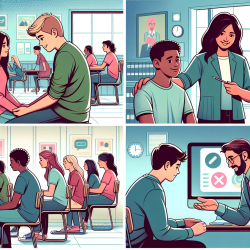Introduction
As mental health professionals working in schools, you may sometimes feel lost in the transition to a remote work environment. The shift to working from home, particularly in the realm of online therapy, has brought both challenges and opportunities. Understanding how to navigate this landscape effectively is crucial to delivering impactful services to children who need them the most.
The Rise of Online Therapy
Online therapy, also known as telehealth, has become a vital tool in providing mental health services in schools. This approach allows therapists to connect with students remotely, offering flexibility and continuity of care even when in-person sessions are not feasible. Data shows that telehealth can be as effective as traditional face-to-face therapy, provided that therapists are equipped with the right tools and strategies.
Challenges of Working from Home
Working from home presents unique challenges for mental health professionals. The absence of a structured school environment can make it difficult to maintain professional boundaries and create a conducive space for therapy. Additionally, the lack of physical interaction with students can make it harder to build rapport and trust.
However, these challenges are not insurmountable. By implementing data-driven strategies, therapists can overcome these obstacles and create a productive work environment at home.
Strategies for Effective Online Therapy
- Create a Dedicated Workspace: Designate a specific area in your home for conducting therapy sessions. This space should be free from distractions and equipped with all necessary technology to facilitate seamless communication.
- Establish a Routine: Set a consistent schedule for therapy sessions to provide structure for both you and your students. This routine can help maintain a sense of normalcy and predictability.
- Leverage Technology: Utilize telehealth platforms that are designed for online therapy. These platforms often come with features that enhance communication and engagement, such as video conferencing, screen sharing, and interactive tools.
- Focus on Engagement: Use data-driven methods to keep students engaged during sessions. This might include incorporating multimedia resources or interactive activities that are tailored to the student's interests and needs.
Data-Driven Outcomes
Research indicates that when therapists employ evidence-based practices in online therapy, outcomes can be significantly improved. Tracking progress through data collection allows for adjustments to be made in real-time, ensuring that therapy remains effective and responsive to each student's needs.
Conclusion
While the transition to working from home may initially feel daunting, embracing online therapy as a viable and effective tool can lead to successful outcomes for both therapists and students. By focusing on creating structured, engaging, and data-driven therapy sessions, mental health professionals can continue to provide essential support to students, regardless of physical location.
At TinyEYE, we are committed to supporting mental health professionals in delivering high-quality online therapy services. Together, we can navigate the challenges of remote work and continue to make a positive impact on the lives of children.










